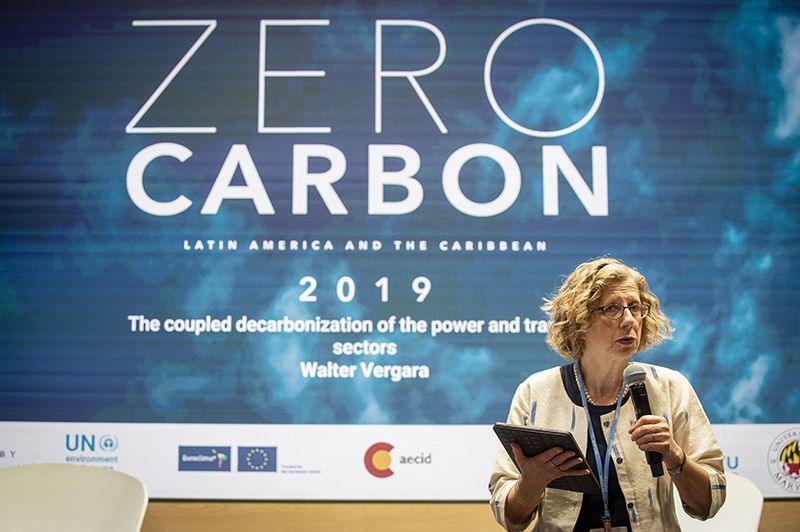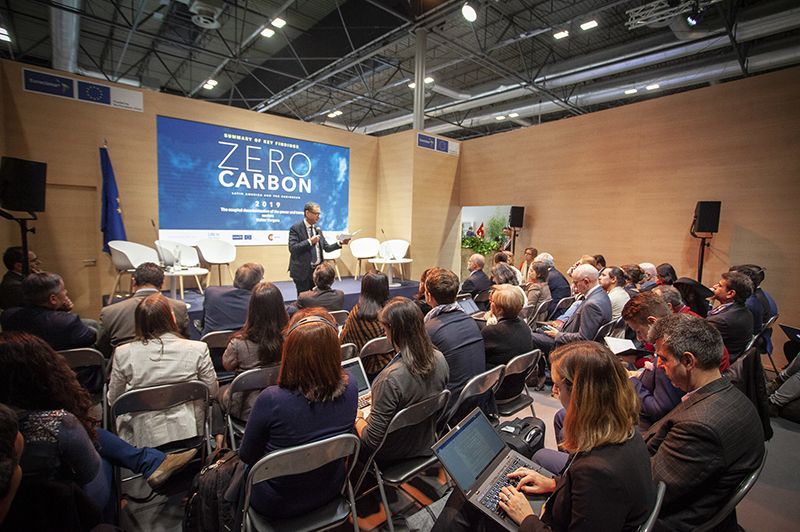- An advance executive summary of the Zero Carbon Latin America and the Caribbean 2019 Report was presented during the COP25 in Madrid.
- The report analyzes the opportunities, costs and benefits of coupled decarbonization of power generation and transportation.
- Bolder policies are needed to achieve net-zero emissions in both sectors by mid-century.
Madrid, 11 December 2019.- Latin America and the Caribbean could achieve annual savings of US$ 621 billion by 2050 if the region’s energy and transport sectors reach net-zero emissions, according to new findings from the UN Environment Programme (UNEP) presented today in Madrid at the UN Climate Change Conference COP25.
The findings are included in an advance executive summary of the Zero Carbon Latin America and the Caribbean 2019, which will be soon published, and which highlights the opportunities, costs and benefits of coupled decarbonization of power generation and transportation. Both sectors account for two thirds of the regional fossil CO2 emissions and about 25 per cent of the greenhouse gas emissions. A two-fold increase in these emissions is expected by mid-century if current policies continue unaltered.
“Both sectors present opportunities for rapid and far-reaching, environmentally sound and financially attractive action. A coupled transition not only aims to reach zero emissions by 2050, but to contribute to the economic growth and to the improvement of public health”, said the UN Environment Programme Regional Director in Latin America and the Caribbean, Leo Heileman.
Under current policies and conditions, the emissions from the energy sector are expected to increase 140 per cent (up to 1.2 billion tons), considering the regional electricity demand will almost triple by 2050. Meeting these new requirements under a fossil fuel-based generation matrix would place the region further away from the 2°C pathway of the Paris Agreement, the report warns.
The conversion to a fully renewable system would be the least cost path to electrify the region and achieve the climate commitments of the Paris Agreement. A renewable matrix will require cumulative investments of US$ 800 billion by 2050, less than the US$ 1083 billion needed to meet the projected power demand under a business as usual scenario, according to the study.
The report shows that by decarbonizing the energy matrix and providing electricity to a full zero-emissions transport system (including marine and land transport), in 2050 the region could reduce 1.1 billion tons of CO2eq and additionally save US$ 621 billion per year.
These savings include US$ 300 billion of avoided expenses in land passenger transport and reductions of US$ 222 billion in electricity costs. US$ 30 billion in health costs could be prevented thanks to the positive effect of electric mobility in urban air quality.
The total savings anticipated by the authors consider the costs of phasing out the installed fossil fuel power plants ahead of its full deprecation. The value of stranded assets was estimated at US$ 80 billion (2018) by mid-century.
The transition to full decarbonization in these specific sectors will create further benefits, such as 7.7 million new permanent jobs and 28 million job-years in temporary assignments related to green technologies, infrastructure deployment or transport electrification.
“This transition represents an important opportunity to raise the level of ambition of Nationally Determined Contributions (NDCs) and long-term strategies with many no-regret options to meet international climate commitments, established under the Paris Agreement and to support the achievement of Sustainable Development Goals” stated Carlos Manuel Rodriguez Echandí, Minister of Environment and Energy of Costa Rica.
Since 2012, the capacity for non-conventional renewables has doubled its participation in the regional matrix, and together with hydropower accounted for almost 54% in 2018. Furthermore, the efforts of several countries to provide an enabling environment for the energetic transition have secured more than US$ 35 billion in investment in non-conventional renewables during the last 5 years (44% of global foreign direct investment).
Some companies have also initiated the energy transition as part of their contributions to the decarbonization and the sustainable development of the region. "We are a company that began making the transition to decarbonization 20 years ago and we have shown that we can create many more jobs and give high returns to our investors," said Carlos Sallé, director of energy policies and climate change.
Despite this progress, the authors call for a bolder policy agenda to accelerate the changes required to fulfill decarbonization by mid-century.
The Zero Carbon Latin America and the Caribbean Report: The opportunity, cost and benefits of the coupled decarbonization of the power and transport sectors in Latin America and the Caribbean, builds on the first Zero Carbon Report on the region (2016), which called on the region to focus in the full decarbonization of four areas that produce 90 per cent of the greenhouse gas emissions: power generation, transportation, land use and industry.
The new edition was produced with the collaboration of Iberdrola and the support of EUROCLIMA+, a programme funded by the European Union, and the Spanish Agency for International Development Cooperation (AECID).
“We want to strengthen our climate diplomacy efforts and keep creating alliances to accelerate the transition to decarbonization taking advantage of the momentum today. As a result, the EU has increase financing for EUROCLIMA+, our flagship programme in the area of climate change in Latin America, to 144 million euros for the second phase. Through this financial and technical cooperation in the region, with the NDCs at the core of the support, we hope to contribute to the couple decarbonization of the power and transport sector in the region, as well as in other sectors”, stated Felice Zaccheo, Head of Unit Regional Operations Latin America and Caribbean, European Commission.
About the UN Environment Programme
UNEP is the leading global voice on the environment. It provides leadership and encourages partnership in caring for the environment by inspiring, informing and enabling nations and peoples to improve their quality of life without compromising that of future generations.
For more information, please contact:
This email address is being protected from spambots. You need JavaScript enabled to view it., UNEP Head of Communications for Latin America and the Caribbean, +507 305-3182, This email address is being protected from spambots. You need JavaScript enabled to view it..


